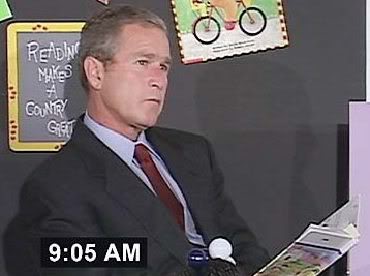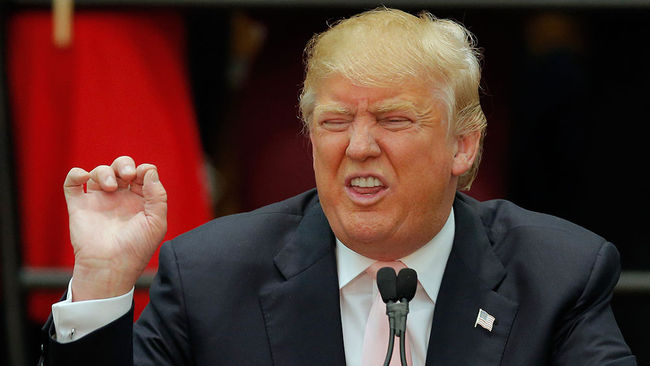
In the wake of Donald Trump’s nomination, Rolling Stone‘s Matt Taibbi gleefully tramps the dirt down on the Grand Old Party. “Th[e] avalanche of verbose disgust on the part of conservative intellectuals toward the Trump voter, who until very recently was the Republican voter, tells us everything we need to know about what actually happened in 2016.”
At this point, the world doesn’t need any more bloviating and/or hot takes about the 2016 horse race — it’s already a cottage industry. And my hope going forward, in the “be-the-change-you-want-to-see-in-the-world” sense, is that GitM political posts will focus on policies over personalities. But, in the interest of old times and catching up on recent events, let me make a few points about that ubiquitous carnival bunker, reality TV buffoon, and now Republican nominee, Donald J. Trump.
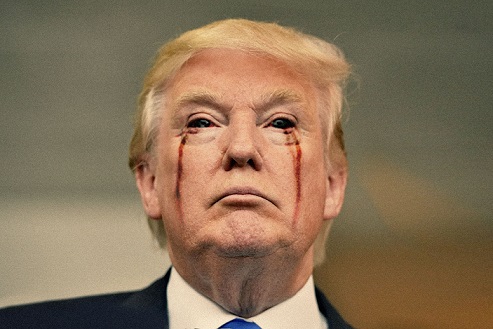
Don’t get me twisted here: A Donald Trump presidency would be a catastrophic disaster for America. However liberal he was until very recently, he has made the calculated decision to run as an openly racist authoritarian, and exploit white anxiety like he’s the second coming of George Wallace. And, true, even if he isn’t a Fascist himself, he’s got white nationalists all happy and energized, and would do until the trouble gets here. But an actual, honest-to-goodness Fascist? No, not really.
Why make this distinction and even try to defend a jackass like the Donald on this point? Because I think it’s important to recognize that:
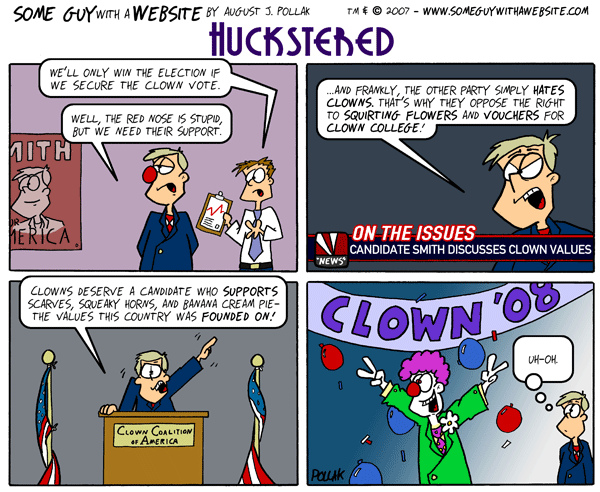
In other words, Trump is basically just pitching what the GOP’s always been selling — he’s the evolutionary Pat Buchanan. “Frankenstein’s monster” isn’t quite the right analogy here, because the Republicans didn’t “create” Trump, exactly. Rather, Trump is a con man who, seeing the grift at work over the years, decided to execute a hostile takeover of the GOP’s flim-flam operation.
Let’s take Trump’s open racism, which is vile, indefensible, repugnant…and pretty much par for the course from the GOP. Ever hear of the Southern Strategy? Or consider Saint Reagan. In 1976, the Gipper ran on reining in “welfare queens” and in 1980, he sang the praises of “state’s rights” (wink, wink) within spitting distance of the 1964 Chaney-Schwerner-Goodman murders. His successor, George H.W. Bush — the nice, statesmanlike Bush — won his election mainly by threatening a black rapist on every block under Dukakis. Just last cycle, those compassionate conservatives Romney and Ryan were happily dogwhistling about “takers,” “makers”, and the 47%.
(Dems aren’t immune to this sort of pitch either, of course. It wasn’t for nothing that, when he wanted to show he was a different kind of Democrat in 1992, Bill Clinton campaigned at a prison on Stone Mountain of all places. This picture from that event explains the optics of that ridiculousness all too well.)
Same goes for the authoritarianism. For a good half-century now, Republicans have gone out of their way to paint themselves as strongmen father figures who keep ‘Murica safe, and Democrats as bleeding-heart, touchy-feely wimps that are soft on communism, crime, and/or terror. We all remember George W. Bush strutting around an aircraft carrier in military fatigues while his campaign had John Kerry windsurfing like a brie-eating, Swift Boat surrender monkey. When his dad H.W. wasn’t race-baiting with Willie Horton in 1988 election, he was insinuating his opponent looked like a girly-man in a tank. Just this year, we had sneering Ted Cruz promising he would “carpet-bomb” Syria “back to the stone age.”
The point being, racism, authoritarian brow-beating, and catering to white grievance has been the GOP’s bread-and-butter for decades. Trump’s brand of evil is their brand of evil. The Donald just gave up the dogwhistle.
But that’s not all he gave up, and this is where the Trump candidacy gets interesting, and where he may spell doom for the GOP as currently constituted.
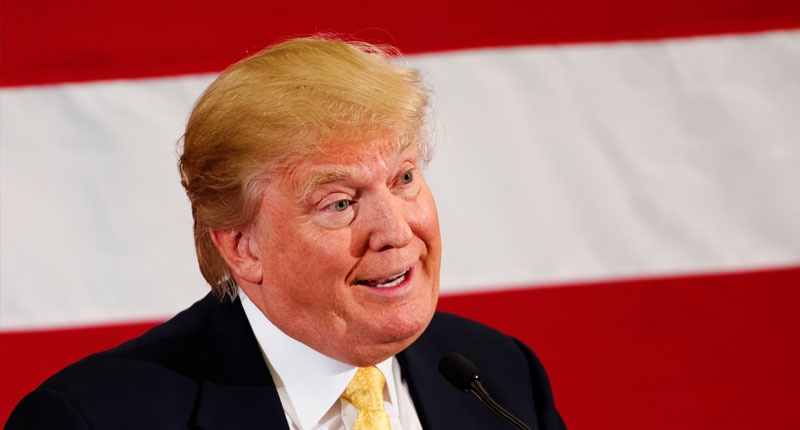
Instead, the GOP base seems to be motivated by Buchananism these days: the (correct) sense that the system has been rigged against them — stagnant wages, blue-collar jobs getting outsourced/downsized, the rich getting away scot-free with everything from not paying taxes to destroying the American economy — and the (deeply incorrect) feeling this is the fault of minorities and outsiders. On one hand, as the saying goes, “when you’re accustomed to privilege, equality feels like oppression,” which is why so many white people whine ridiculously about reverse racism. On the other hand, they are being screwed over, just like everybody else, by rampant inequality, a disappearing middle-class, and an eroding social safety net. Some (though by no means all) Trump supporters are feeling that pressure particularly acutely.
In any event, like southern Populists of old (Tom Watson comes to mind), Trump wrestled power away from the GOP Bourbons by tapping into the economic and racial grievances of angry whites, but then chose to blame minorities for those problems. It’s an age-old trick that got him through the white-people-only primaries, but, as I’ll get to in a moment, it will be his downfall in November.
Still, even after he gets his hat handed to him in a few months, Trump’s ascension could well mean a very different GOP from now on — less “conservative”, more nationalistic. While the freak show types who obsess over public bathrooms will always have a home in their little tent, there may well be less talk of Big Guvmint going forward, and more railing against free trade and outsiders. (But, if they maintain their current trajectory, even that will likely only buy them a decade or two.)
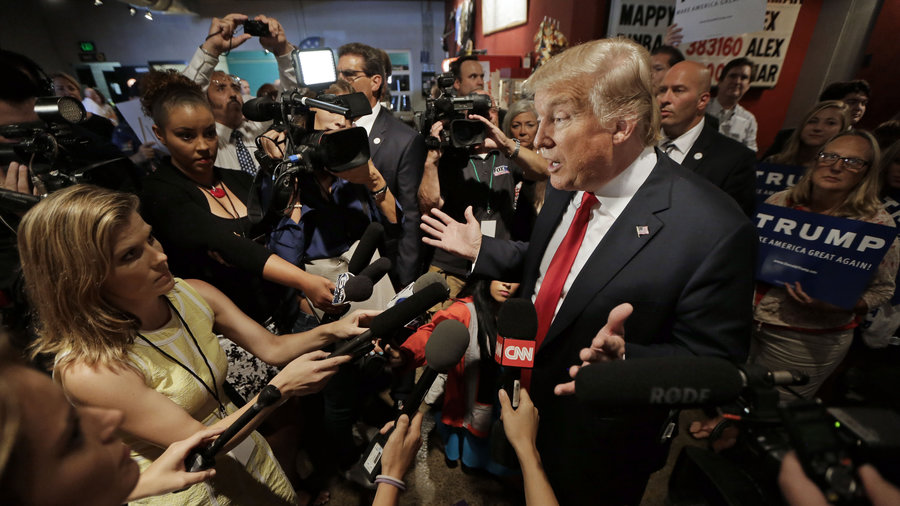
And, of course, Trump gamed the broken fourth estate like there’s no tomorrow, garnering $2 billion in free media as of March 2016 simply by being a loudmouth, racist, (and thus click-baity) douchebag. (Ten Dumb Things Trump Said Today – You Won’t Believe Number 4!) CNN in particular has been covering him like he’s the OJ trial unfolding on a missing Malaysian plane. And now that he’s the actual, honest-to-goodness nominee, the media will normalize every nonsense thing that comes out of his mouth — even flagrantly racist bunkum — all in the spirit of Fair and Balanced.
As I said back in 2011 of Trump and at various other times, this is what our broken, High Broderian “both sides” punditocracy does. It’s the same reason we have Paul Ryan, easily as much of a huckster as the Donald, among us these days, and why we get stories like (I kid you not) “Paul Ryan’s Greatest Weakness: Is He Too Smart To Be President?” Er, no, J.R., he’s not.
Anyway, the real upshot here, after the next several months of sturm und drang, is that:
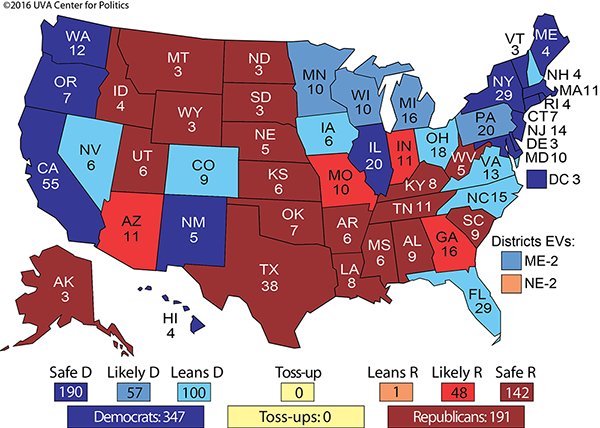
Graham is right. The Californication I talked about after the 2010 midterms is, at least in presidential years, becoming inexorable. Last time around, Mitt Romney won white people by 20 points (59-39)…and still lost handily. The electorate is even less white now than it was then, and will only grow more so. Even Karl Rove concedes that white people alone can’t get it done anymore.
So, what did the GOP do? Their only possible chance in 2016 was to open the party to people of color — maybe a Rubio or Cruz could’ve gained some headway there, tho’ I doubt it. Instead, like alcoholics to the bottle, they chose to double down yet again on angry white people. Donald Trump is the inevitable result of their demographic implosion.
In any case, to be elected president in November, Trump would have to perform even better among whites than Romney did. That doesn’t seem likely. Trump’s numbers are horrible with women. He doesn’t seem to believe in using 21st century GOTV efforts. He’s extraordinarily thin-skinned and always one or two steps away from a campaign meltdown. And, if anything, his constant racism will energize Latinos and other minorities to come out against him in force.
I’ll go ahead and lay down a marker: This election is not going to be close. In fact, it’s going to be a shellacking. There’s only two conceivable ways, as I see it, that Trump could eke it out. There could be some sort of catastrophic event leading up to the election — a major terrorist attack or financial collapse or somesuch. Or the Democrats, for some reason, decide to choose a really, really unpopular candidate to run against him. And neither of those are going to happ…
(Nah, he’s still going to lose.)

